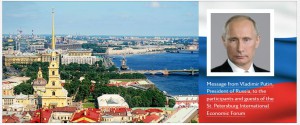 Ignoring the potential threat of further sanctions, both Exxon and BP have strengthened ties with Russia’s state-controlled oil company, Rosneft, in deals that can also only be seen as bad news for the climate.
Ignoring the potential threat of further sanctions, both Exxon and BP have strengthened ties with Russia’s state-controlled oil company, Rosneft, in deals that can also only be seen as bad news for the climate.
Exxon’s and BP’s actions will also be frowned upon by Ukraine’s fledgling government.
Despite the fact that Rosneft’s chief executive Igor Sechin is on the US blacklist, this did not stop Exxon and BP signing agreements with him at Russia’s equivalent of Davos, an international economic forum in St. Petersburg. At the forum, Sechin laughed off sanctions saying they “don’t seem so threatening any more”.
The US State Department had asked Exxon to stay away from the international forum in Putin’s hometown. But business has long trumped human rights in the oil business and so as many international banks and American businesses stayed away the international oil barons were in town.
At the forum, President Putin called on the oil companies to “move to new areas, often hard to access, or increase production at old fields … and develop reserves that were traditionally considered economically less efficient and hard to reach”.
And true to these words, the Exxon-Rosneft deal extends an existing deal to drill for oil in the Arctic and Siberia. Exxon is looking to build on the fact that it is already the biggest player in Russia. They are hoping to secure a significant chunk of Russia’s 75 billion barrels of reserves.
Despite the fact that Russia is the world’s leading oil producer with an estimated output of around 10.5 million barrels per day (bpd), the majority of this production is coming from Siberian fields which are depleting. Therefore Russia either has to drill in the Arctic or to frack.
And as Exxon gears up for the Arctic, BP’s gears to frack.
On Saturday, BP signed a $300 million deal with Sechin and Rosneft to frack for shale oil in the Volga-Urals region of central Russia.
Rosneft will hold 51 percent of the joint venture which will explore the so-called Domanic formation with BP holding 49 percent. Let’s not forget that BP also holds an almost 20 percent stake in Rosneft itself.
Moscow is hoping to replicate the American shale oil boom in the United States. “We are very pleased to be a part of Russian energy complex,” Bob Dudley, the CEO of BP told the forum.
After the signing ceremony Dudley added said that President Putin “has urged us today to invest into shale oil… There’s so many natural resources in Russia, the openness and partnerships Russia has with companies from all over the world is a good thing for energy.”
But it will be a bad thing for the climate and the environment. And the deals by BP and Exxon will also be seen as a snub for those fighting for democracy in Ukraine.
Because if sanctions are effectively ignored by the oil majors, this can only strengthen Putin’s hand in any future conflict.
